|
|
|
Sort Order |
|
|
|
Items / Page
|
|
|
|
|
|
|
| Srl | Item |
| 1 |
ID:
188038
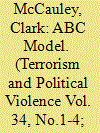

|
|
|
|
|
| Summary/Abstract |
In this commentary, I compare the ABC model of radicalization with the Two Pyramids model of radicalization. Both models distinguish radicalization of opinion from radicalization of action. Beyond this agreement are questions about the concepts deployed in advancing the ABC model and research issues relating to applications of the two models. I conclude with an optimistic assessment of recent progress in research on terrorism, including the suggestion that deradicalization of action may be forwarded by giving up on deradicalization of opinion.
|
|
|
|
|
|
|
|
|
|
|
|
|
|
|
|
| 2 |
ID:
120325


|
|
|
|
|
| Publication |
2013.
|
| Summary/Abstract |
No matter how unlikely it may seem, radical Leftists and Islamists have come closer in recent years. Drawing on substantial ideological interchange, and operating at both state and non-state levels, the two movements are building a Common Front against the United States and its allies. In this article, we use framing theory to examine the contemporary convergence of political Islam and the radical Left. Both radical Leftists and Islamists have utilized the master frame of anti-globalization/anti-capitalism and the master frame of anti-colonialism/anti-imperialism to elicit support from the widest possible range of people. The emerging Red-Green alliance presents a complex challenge that will require careful attention from U.S. and European policymakers.
|
|
|
|
|
|
|
|
|
|
|
|
|
|
|
|
| 3 |
ID:
069624
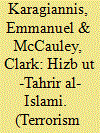

|
|
|
| 4 |
ID:
087766
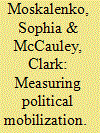

|
|
|
|
|
| Publication |
2009.
|
| Summary/Abstract |
In this paper we review and extend measures of political mobilization: the increasing extremity of beliefs, feelings, and behaviors in support of inter-group conflict. Building on previous research, we introduce the Activism and Radicalism Intention Scales (ARIS). The Activism Intention Scale assesses readiness to participate in legal and non-violent political action, whereas the Radicalism Intention Scale assesses readiness to participate in illegal or violent political action. In ad-hoc samples of U.S. and Ukrainian undergraduates, and in an Internet panel survey representative of the U.S. population, Activism and Radicalism intentions formed two correlated but distinguishable dimensions. The popular "conveyor belt" metaphor of radicalization (implying that activism leads easily to radicalism and that most radicals emerge from activism) found only mixed support in our results. Discussion suggests the potential usefulness of the ARIS for learning about how individuals move from political attitudes and beliefs to political action, including political violence and terrorism.
|
|
|
|
|
|
|
|
|
|
|
|
|
|
|
|
| 5 |
ID:
082926
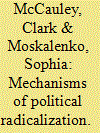

|
|
|
|
|
| Publication |
2008.
|
| Summary/Abstract |
This article conceptualizes political radicalization as a dimension of increasing extremity of beliefs, feelings, and behaviors in support of intergroup conflict and violence. Across individuals, groups, and mass publics, twelve mechanisms of radicalization are distinguished. For ten of these mechanisms, radicalization occurs in a context of group identification and reaction to perceived threat to the ingroup. The variety and strength of reactive mechanisms point to the need to understand radicalization-including the extremes of terrorism-as emerging more from the dynamics of intergroup conflict than from the vicissitudes of individual psychology.
|
|
|
|
|
|
|
|
|
|
|
|
|
|
|
|
| 6 |
ID:
066740
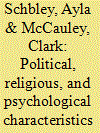

|
|
|
| 7 |
ID:
133538
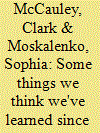

|
|
|
|
|
| Publication |
2014.
|
| Summary/Abstract |
It is a pleasure to have this opportunity to respond to a distinguished colleague's concerns about the progress of terrorism research since the 9/11 attacks. Marc Sageman sees little progress and identifies numerous impediments to research, notably including lack of good data and over-reliance on formal modeling
|
|
|
|
|
|
|
|
|
|
|
|
|
|
|
|
| 8 |
ID:
134991
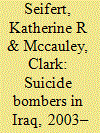

|
|
|
|
|
| Summary/Abstract |
Extending data reported by Mohammed Hafez in 2007, we compiled a database of 1,779 suicide bombers who attempted or completed attacks in Iraq from 2003 through 2010. From 2003 through 2006, monthly totals of suicide bombers show a pattern different from the pattern of non-suicide insurgent attacks, but from 2007 through 2010 the two patterns were similar. This biphasic pattern indicates that suicide attacks sometimes warrant separate analysis but sometimes are just one tactic in a larger envelope of insurgent violence. We also show that only 13 percent of suicide bombers targeted coalition forces and international civilians, primarily during the early years of the conflict, whereas 83 percent of suicide bombers targeted Iraqis (civilians, members of the Anbar Awakening Movement, Iraqi security forces, and government entities) in attacks that extended throughout the duration of the insurgency. These results challenge the idea that suicide attacks are primarily a nationalist response to foreign occupation, and caution that “smart bombs” may be more often sent against soft targets than hard targets. More generally, our results indicate that suicide attacks must be disaggregated by target in order to understand these attacks as the expression of different insurgent priorities at different times.
|
|
|
|
|
|
|
|
|
|
|
|
|
|
|
|
| 9 |
ID:
090138
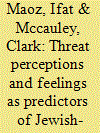

|
|
|
|
|
| Publication |
2009.
|
| Summary/Abstract |
A representative sample of Israeli Jews (N = 504) completed a survey assessing attitudes towards compromise in the Israeli-Palestinian conflict. Support for compromise was well predicted (R = .63) by a combination of four scales: perception of collective threat from Palestinians, perception of zero-sum relations between Palestinians and Israelis, personal fear of Palestinians, and sympathy towards Palestinians. Feelings of hostility towards Palestinians did not make an independent contribution to this prediction. As hypothesized, respondents who perceived high collective threat and zero-sum relations were much less supportive of making concessions to Palestinians. However, respondents who indicated feeling personal fear were in regression analysis slightly more supportive of compromise. Sympathy toward Palestinians was associated with more support for compromise. Additionally, religiosity was strongly associated with decreased support for compromise. However, entering threat perceptions and sympathy into the equation substantially reduced the predictive value of religiosity, indicating that psychological mechanisms underlie, at least in part, the tendency of more religious respondents to show less support for making concessions to Palestinians.
|
|
|
|
|
|
|
|
|
|
|
|
|
|
|
|
| 10 |
ID:
080823
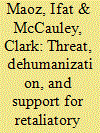

|
|
|
|
|
| Publication |
2008.
|
| Summary/Abstract |
Public opinion can permit or encourage retaliatory aggressive state policies against vulnerable but threatening out-groups. The authors present a model in which public support for such policies is determined by perceived threat from and dehumanization of the target group. This two-factor model predicts Israeli Jews' support for two retaliatory aggressive policies: the more hypothetical notion of Palestinian population transfer and concrete, coercive actions toward Palestinians. The authors find (1) that threat and dehumanization are distinct constructs, each having unique contributions to explaining support for aggressive retaliatory policies, (2) that threat and dehumanization significantly explain support for aggressive retaliatory policies when respondents' hawkishness, socioeconomic status (SES), and education level are taken into account, and (3) that the association of hawkishness and SES with support for aggressive retaliatory policies is largely mediated by threat perception. Results are highly consistent across two studies, suggesting the two-factor model may be useful for understanding support for aggressive action in situations of asymmetric conflict
|
|
|
|
|
|
|
|
|
|
|
|
|
|
|
|
| 11 |
ID:
132363
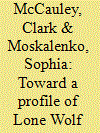

|
|
|
|
|
| Publication |
2014.
|
| Summary/Abstract |
Research has shown that there is no profile of individual characteristics of group-based terrorists, but profiling the characteristics of lone wolf terrorists may yet be possible. In this article, we bring together suggestions about what a lone wolf profile might look like. We describe a two-pyramids model that distinguishes radicalization of opinion from radicalization of action, then use this model to review three case histories of lone wolf terrorists. We also review results comparing two kinds of mostly lone actor violent offenders: assassins and school attackers. Results highlight the gap between radical opinion and radical action, and suggest two profiles of lone wolf terrorists: disconnected-disordered are individuals with a grievance and weapons experience who are social loners and often show signs of psychological disorder; caring-compelled are individuals who strongly feel the suffering of others and feel a personal responsibility to reduce or avenge this suffering.
|
|
|
|
|
|
|
|
|
|
|
|
|
|
|
|
| 12 |
ID:
109144
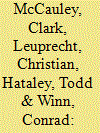

|
|
|
|
|
| Publication |
2011.
|
| Summary/Abstract |
A 2008 poll of 430 Ottawa Muslims found predominantly negative views of the U.S. war on terrorism, including the war in Iraq and the war in Afghanistan. This poll also assessed approval of Western powers (U.S., Canada, Israel, United Nations) and challengers of Western power (Al-Qaeda, Hamas, Hizballah, government of Iran). Surprisingly, attitudes of Ottawa Muslims toward militant Muslim groups were unrelated to their attitudes toward Western governments. Discussion suggests that this pattern, if confirmed in other Muslim polls, would mean that the war of ideas against radical Islam must address not one target but two: favorable opinions of militants and unfavorable opinions of the U.S. Muslims who come to like the West more may not like Muslim militants any less.
|
|
|
|
|
|
|
|
|
|
|
|
|
|
|
|
| 13 |
ID:
084089
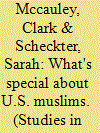

|
|
|
|
|
| Publication |
2008.
|
| Summary/Abstract |
Since 11 September 2001, Europe has suffered multiple jihadi attacks but the United States has not. This "American exceptionalism" has been attributed to the special qualities of U.S. Muslims, who are seen as politically better integrated and less sympathetic toward radical politics than other Muslims. This article tests the exceptionalism hypothesis by comparing results from a 2007 Pew poll of U.S. Muslims with results from 2006-2007 START polls of Muslims in Morocco, Egypt, Pakistan, and Indonesia. On questions about religious identity, attitude toward Al Qaeda, U.S. intentions in the War on Terrorism, and suicide terrorism, U.S. Muslims differed only slightly from comparison Muslims.
|
|
|
|
|
|
|
|
|
|
|
|
|
|
|
|
|
|
|
|
|